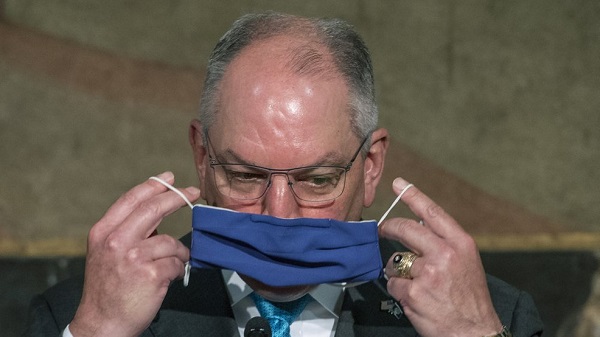
11.24.20 – WEAR — Baton Rouge, La. (AP)
With Louisiana seeing a new spike in coronavirus hospitalizations, Gov. John Bel Edwards on Tuesday toughened restrictions on businesses and gatherings ahead of Thanksgiving, worried the holidays would only worsen the outbreak’s spread.
“Our numbers are not good, and they’re getting worse everywhere. This is clearly a statewide surge, and it requires a statewide, coordinated effort,” Edwards said.
The Democratic governor decreased the number of customers allowed at restaurants, gyms, salons, casinos, malls and other nonessential businesses from 75% of their occupancy rate to 50%. Crowds at churches will be capped at 75% of their capacity, with distancing among people of different households required.
The new rules take effect Wednesday and expire Dec. 23. The statewide mask mandate will remain in place.ADVERTISING
Most bars likely will be limited to takeout, delivery and outside seating only, under new restrictions that require parishes to have low percentages of coronavirus tests returning positive to allow indoor drinking at bars.
Crowd sizes at high school football games will shrink to 25%, the same maximum that’s already been in place for college football games. Indoor gatherings for weddings and events will be limited to 75 people or a maximum of 25% occupancy, whichever is less. Outdoor gatherings have looser limits.
The intensified restrictions come as Louisiana is experiencing its third surge in infections of the COVID-19 disease caused by the coronavirus. Hospitals are cautioning they are concerned the latest swell in cases will overwhelm their facilities.
“The path ahead right now is dangerous. This is a dangerous time for Louisiana,” said Dr. Joe Kanter, the governor’s chief public health adviser. “We are now in lockstep with the rest of the country.”
On Tuesday, hospitalizations reached 1,052 according to the Louisiana Department of Health. While that’s well below the peak of nearly 2,000 in April, COVID-19 hospitalizations are the highest they’ve been since August, jumping 77% during November alone, according to the data.
At least 6,072 people in Louisiana are confirmed to have died from the disease since March, according to the health department.
Edwards’ new coronavirus rules send Louisiana back from Phase 3 restrictions that had been in place for two months to something that looks like the Phase 2 guidelines the governor enacted from June until mid-September. The White House’s coronavirus advisers urged Louisiana to step up its restrictions amid its third wave of infections.
The governor hopes that, in addition to slowing the latest outbreak, toughened state rules will impress the urgency of the problem on people gathering for Thanksgiving. He’s repeatedly cautioned against the usual inside dinner of extended family and friends, saying that could put people’s health — and lives — at risk.
Edwards’ announcement prompted a rebuke from Daniel Erspamer, CEO of the conservative Pelican Institute for Public Policy. He said the tightened restrictions “will make matters worse for Louisiana families who have been suffering for months on end.”
“Everyone wants to protect our most vulnerable citizens, but reverting to blunt instrument lockdown policies that have dire unintended consequences is unwise and disappointing,” Erspamer said in a statement.
Louisiana had two prior surges of the coronavirus: an outbreak in March and April in the New Orleans region, and a statewide swell in June and July. All regions of the state are seeing case spikes this month, with the health department confirming more than 11,000 new infections of COVID-19 disease over the past week.
With a vaccine expected to be available for widespread use within months, Edwards encouraged people not to let their guard down yet.
“We are looking for renewed emphasis, attention, compliance for a finite amount of time, and I hope that that inspires people to do what is required knowing that they’re not going to have to do it forever,” he said. “But the next several months will be critical.”
The state health department has reported more than 213,000 confirmed coronavirus cases since the pandemic began. Nearly 186,000 people are presumed recovered, but that leaves thousands who could have active infections and be spreading the virus.
The number of people who have had COVID-19 is expected to be higher than the confirmed count because some people never have symptoms or never get tested.
The health department has reported another 11,000 probable coronavirus cases, detected through antigen tests. Those tests provide quick on-site results and are less expensive to administer than the more widely used molecular tests, but the tests are deemed less accurate.
